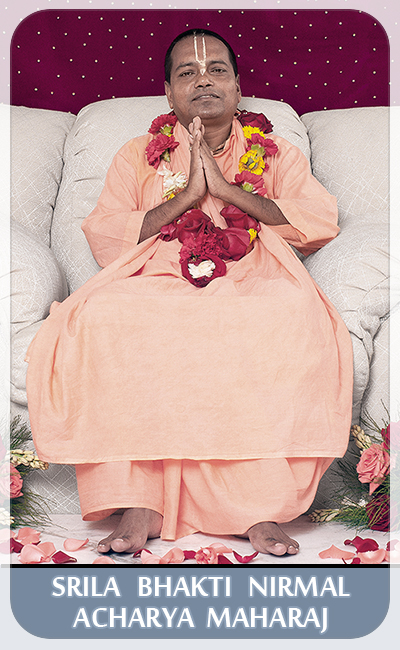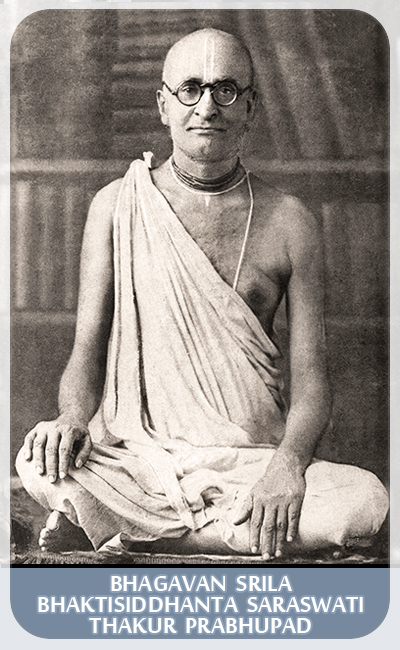Our Disciplic Succession:



|
"The Sun Never Sets on Sri Chaitanya Saraswat Math":
|
| ABOUT US | GUIDANCE | LIBRARY | DAILY PRACTICE | PHOTO | CALENDAR | CONTACT |
SARANAGATI (SURRENDER) | Sri Laghu-chandrika-bhasya
Mangalacharana
Invocation of Auspiciousness
(Song 1)
sri-krsna-chaitanya prabhu jive daya kari'
sva-parsada sviya dhama saha avatari' [1]
sri-krsna-chaitanya–Sri Gaurasundar; prabhu–Lord; jive–to the conditioned souls; daya–mercy; kari'–doing; sva-parsada–His own associates; sviya–His own; dhama–abode; saha–with; avatari'–descending. [1]
(1) Being merciful to the souls, Sri Krishna Chaitanya Mahaprabhu descends with His associates and abode.
|
Commentary: (1) Sri-krsna-chaitanya: 'Sri Krishna Chaitanya' is the sannyas name of Sri Gaurasundar. Sarvabhauma Bhattacharya uses this name in his prayers to the Lord:
kalan nastam bhakti-yogam nijam yah (Sri Chaitanya-bhagavat: Antya-lila, 3.123) "May the honeybee of my heart be ever more deeply attached to the lotus feet of He who has now appeared as Sri Krishna Chaitanya to revive the practice of devotion to Himself, which had become lost due to the influence of time." In Sri Chaitanya-bhagavat (Madhya-lila, 28.175-176, 181), Sri Gaurasundar's sannyas ceremony is described:
yata jagatere tumi 'krsna' bolaila [Sri Kesava Bharati said:] "You have induced the whole world to chant Krishna's Name and brought everyone to life (chaitanya) by inaugurating the sankirtan movement. Therefore Your name will be 'Sri Krishna Chaitanya'. Because of You, everyone in the whole universe has become fortunate."
hena mate sannyasa kariya prabhu dhanya "In this way, the Lord gloriously accepted sannyas and revealed His name 'Sri Krishna Chaitanya'." sva-parsada: "His associates." This means His servants, as is implied in Srimad Bhagavad-gita (9.25):
yanti deva-vrata devan pitrn yanti pitr-vratah "Those who are devoted to the demigods go to the realm of the demigods; those who are devoted to the ancestors go to the realm of their ancestors; those who are devoted to ghosts and spirits go to the realm of such beings; and those who are devoted to Me come to Me (reside in My abode)." dhama: "Abode." This means the spiritual domain of the Lord. Krishna describes His abode in Srimad Bhagavad-gita (15.6):
na tad bhasayate suryo na sasanko na pavakah "Having reached My supreme abode, which cannot be illuminated by the sun, the moon, or fire (anything material), the surrendered souls never return to this mundane world." |
atyanta durlabha prema karibare dana
sikhaya saranagati bhakatera prana [2]
atyanta–extremely; durlabha–rare, precious, difficult to obtain; prema–divine love; karibare–in order to do; dana–distribution; sikhaya–teaches; saranagati–surrender; bhakatera–of the devotees; prana–the life. [2]
(2) To distribute the most rare form of prema, He teaches saranagati, which is the life of the devotees.
|
Commentary: (2) Atyanta durlabha prema: "The most rare form of prema." This refers to the fifth (ultimate) end of human life: Sri Krishna-prema. The rarity of Sri Krishna-prema has been noted by Srila Rupa Goswami Prabhu in his Bhakti-rasamrta-sindhu (1.1.36):
jnanatah sulabha muktir bhuktir yajnadi-punyatah [Siva says:] "Liberation (moksa) is easily attained by cultivating knowledge of Brahma (jnan). Heavenly enjoyment (bhukti) is easily attained by performing various types of pious activities (karma), such as sacrifices. However, even by following thousands of different spiritual practices, Hari-bhakti is extremely difficult to attain (as it requires: servitude to the Lord's pure devotees; a proper conception of the Lord's divine nature; firmly fixed loving attachment for the Lord devoid of any impurities (asakti); and the Lord's merciful acceptance of the practitioner)." In Sri Chaitanya-charitamrta (Adi-lila, 1.4), this most rare form of prema, which Sri Chaitanya Mahaprabhu came to distribute, is described as follows:
anarpita-charim chirat karunayavatirnah kalau "May the radiant, golden Lord, Sri Sachi Nandan, always be manifest in the core of your heart. He mercifully descended in the Age of Kali to give the wealth devotion to Himself—supremely exalted madhura-rasa—which had never been given before." saranagati: "Surrender." This means to take shelter of the Lord in all respects. Saranagati is defined in essence in Sri Sri Prapanna-jivanamrtam (1.35):
bhagavad-bhaktitah sarvam ity utsrjya vidher api "Having faith that everything is attained by serving the Supreme Lord, abandoning subservience to even scriptural injunctions, and taking shelter of Sri Krishna's feet exclusively, is known as saranagati." |
dainya, atma-nivedana, goptrtve varana
'avasya raksibe krsna'—visvasa palana [3]
bhakti-anukula-matra karyera svikara
bhakti-pratikula-bhava varjanangikara [4]
sad-anga saranagati ha-ibe yanhara
tanhara prarthana sune sri-nanda-kumara [5]
dainya–humility; atma–self; nivedana–submission; goptrtve–of guardianship; varana–acceptance; avasya–certainly; raksibe–will protect; krsna–the Supreme Personality of Godhead; visvasa–faith; palana–maintenance; bhakti–to devotion; anukula–favourable; matra–only; karyera–of actions; svikara–acceptance; bhakti–to devotion; pratikula–unfavourable; bhava–nature, disposition; varjana–rejection; angikara–acceptance. [3–4] sad–six; anga (prakara angera dvara)–aspects (by way of these); saranagati (prapatti)–surrender; ha-ibe–will be; yanhara–whose; tanhara–his; prarthana–prayers; sune–hears; sri-nanda-kumara–Krishna, the son of Nanda Maharaj. [5]
(3–5) Humility, self-submission, embracing the Lord's guardianship, maintaining the faith that 'Krishna will certainly protect me', engaging only in activities which are favourable to devotion, and rejecting everything unfavourable to devotion—Sri Nanda Kumar hears the prayers of one who surrenders in this six-fold way.
|
Commentary: (3) Dainya: "Humility." This is also known as karpanya, experience of one's lamentable condition. Dainya has been defined in Sri Sri Prapanna-jivanamrtam (8.1–2):
bhagavan raksa raksaivam arta-bhavena sarvatah "'O Lord, please protect me, protect me...' Praying thus in a mood of distress, while remembering in all respects the greatness of the mercy of the Supreme Lord, the unparalleled ocean of compassion, and remembering in particular one's own most lamentable lowliness—this condition of the devotees is described by the learned as karpanya." atma-nivedana: "Self-submission." This is also known as atmotsarga, self-dedication, and has been defined in Sri Sri Prapanna-jivanamrtam (7.4):
krsnayarpita-dehasya nirmamasyanahankrteh "Atma-nivedan is known as the condition of having offered one's self to Krishna (solely to satisfy Him), while being devoid of possessiveness and false egotism." goptrtve varana: "Embracing the Lord's guardianship." This is also referred to as accepting the Lord as one's maintainer and has been defined in Sri Sri Prapanna-jivanamrtam (6.1–2):
he krsna! pahi mam natha krpayatmagatam kuru "'O Krishna, please protect me! O Lord, kindly accept me as Your own.' This prayer to attain Sri Krishna as one's master is supremely pleasing to the hearts of the devotees and is known as goptrtve varanam, 'embracing the Lord's guardianship'. Goptrtve varanam expresses the very ideal of surrender and is thus considered to be its complete embodiment (angi). (The other five aspects of surrender are considered limbs (angas).)" 'avasya raksibe krsna': "Krishna will certainly protect me." This refers to faith that 'Sri Krishna will assuredly grant His protection' and has been defined in Sri Sri Prapanna-jivanamrtam (5.1):
raksisyati hi mam krsno bhaktanam bandhavas cha sah "'Certainly Krishna will protect me, because He is the true friend of the devotees. He will definitely bless me with all good fortune.' Herein, such faith is sustained." (4) anukula: "Favourable." This refers to anything helpful for attaining Krishna and has been defined in Sri Sri Prapanna-jivanamrtam (3.1):
krsna-karsnaga-sad-bhakti prapannatvanukulake "Resolute conviction to do everything that is favourable to the service of Krishna, to the service of His devotees, and to surrender, is called anukulyasya-sankalpah, acceptance of the favourable." pratikula: "Unfavourable." This refers to anything that is an obstacle to attaining Krishna, and has been defined in Sri Sri Prapanna-jivanamrtam (4.1):
bhagavad-bhaktayor bhakteh prapatteh pratikulake "Resolute conviction to abandon everything that is opposed to the service of the Lord, to the service of His devotees, and to surrender, is called pratikulya-varjanam, rejection of the unfavourable." (5) sad-anga saranagati: "Surrenders in this six-fold way." The six aspects of surrender are defined within Sri Vayu-purana and the Vaisnava-tantra:
anukulyasya sankalpah pratikulya-vivarjanam "Accepting everything favourable, rejecting everything unfavourable, being confident that Krishna will grant His protection, embracing Krishna's guardianship, fully offering one's self to Krishna, and feeling oneself to be lowly are the six aspects of saranagati." prarthana sune: "Sri Nanda Kumar hears their prayers." This means Krishna reciprocates with the surrendered souls in accordance with their prayers.
sakrd eva prapanno yas tavasmiti cha yachate (Ramayana: Yuddha-kanda, 18.33) [Ramachandra proclaims:] "Anyone who even once sincerely surrenders unto Me, declaring, 'I am Yours', and prays for fearlessness—it is My vow that I will always grant that to them." |
rupa-sanatana-pade dante trna kari'
bhakati-vinoda pade duhun pada dhari' [6]
rupa–Srila Rupa Goswami Prabhu; sanatana–Srila Sanatan Goswami Prabhu; pade–at the feet of; dante–in the teeth; trna–piece of straw; kari'–doing; bhakati-vinoda–Bhakti Vinod; pade–falls; duhun–both; pada–feet; dhari'–clasping. [6]
(6) Bhakti Vinod places a straw between his teeth and falls before Srila Rupa Goswami Prabhu and Srila Sanatan Goswami Prabhu, clasping their feet.
|
(6) sri-rupa-sanatana: Srila Rupa Goswami Prabhu and Srila Sanatan Goswami Prabhu are the two acharyas who teach saranagati. |
kandiya kandiya bale ami ta' adhama
sikhaye saranagati karahe uttama [7]
kandiya–crying; kandiya–and crying; bale–says; ami–I; ta'–certainly; adhama–fallen, lowest; sikhaye–by teaching; saranagati–surrender; karahe–please make; uttama–elevated, beyond the darkness of illusion. [7]
(7) Crying incessantly, he prays, "I am so lowly! Please elevate me by teaching me saranagati."
|
(7) Uttama: "Elevated." This refers to one who is qualified for the topmost form of devotion, prema-bhakti. In Srimad Bhagavatam (11.11.32), Krishna says:
ajnayaivam gunan dosan mayadistan api svakan "Realising the qualities and faults of the socio-religious system (varnasram-dharma) which I have instituted, one who completely abandons it and serves Me is the best of all sadhus." |
<< Back to the main page
<< Back to the library
· Translator's Note
· In Praise of Saranagati
(1)
· In Praise of Saranagati
(2)
· Editor's Note
· Sri Laghu-chandrika-bhasya:
Mangalacharana
· Sri Laghu-chandrika-bhasya:
Preface
Saranagati:
-
Mangalacharana
- (1) Sri Krsna Chaitanya
- (2) Bhuliya tomare
- (3) Vidyara vilasa
- (4) Yauvane yakhana
- (5) Amara jivana
- (6) Suna mora duhkhera kahini
- (7) Tuya pade e minati mora
- (8) Emana durmati
- (9) Na karalun karama
- (10) Pranesvara! Kahabu ki sarama ki bata
- (11) Manasa deha geha yo kichhu mora
- (12) Aham mama sabda arthe
- (13) Amare balite prabhu
- (14) Vastutah sakali tava
- (15) Nivedana kari Prabhu tomara charane
- (16) Atma-nivedana tuya pade kari
- (17) Ki jani ki bali tomara dhamete
- (18) Dara putra nija-deha
- (19) Sarvasva tomara charane sampiya
- (20) Tumi sarvesvaresvara, vrajendra-kumara
- (21) Ekhana bhujhinu prabhu!
- (22) Tumi ta' maribe yare
- (23) Atma-samarpane gela abhimana
- (24) Chhodata purusa-abhimana
- (25) Kesava tuya jagata vichitra
- (26) Tuya bhakti-pratikula dharma
- (27) Visaya-vimudha ara mayavadi jana
- (28) Ami ta' svananda-sukhada-vasi
- (29) Tuya bhakti-anukula ye ye karya haya
- (30) Godruma-dhame bhajana-anukule
- (31) Suddha-bhakata charana-renu
- (32) Radha-kunda-tata-kunja-kutira
- (1) Prapanche padiya agati ha-iya
- (2) Arthera sanchaye, visaya-prayase
- (3) Bhajane utsaha, bhaktite visvasa
- (4) Dana, pratigraha, mitho gupta-katha
- (5) Sanga-dosa-sunya, diksitadiksita
- (6) Nira-dharma-gata, jahnavi-salile
- (7) Vaisnava thakura dayara sagara
- (8) Tomare bhuliya, avidya-pidaya
- (9) Sri-rupa-gosani, sri-guru-rupete
- (10) Bada krpa kari', gauda-vana-majhe
- (11) Gurudev krpa-bindu diya
- (12) Kabe mora sei dina ha'be
- (13) Kabe tava karuna prakase
- (14) Kabe gaura-vane, suradhuni-tate
- (15) Dekhite dekhite, bhuliba va kabe
- (16) Vrsabhanu-suta-charana-sevane
Bhajana-Lalasa (Hankering for Service):
Siddha-Lalasa (Hankering for Fulfilment):
Vijnapti (Prayer of Heartfelt Hankering):
Sri Nama-Mahatmya (The Glories of the Name):
Sitemap | Contact us | About us
